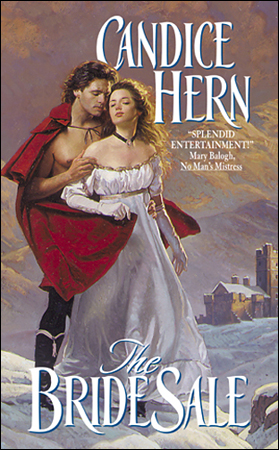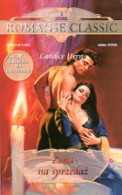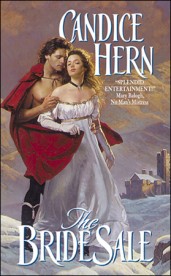USAToday BestsellerAn Award Winning Book



Verity Osborne was a young woman who had allowed others to direct her life, but now faced a situation so shocking she must find the strength to fight for her safety, her sanity, her virtue . . . and to fight against a dangerous attraction.
They called him Lord Heartless. James Harkness preferred a vile and fearful reputation rather than have the shameful truth revealed . . . until the healing power of love changed his life.
 Read an Excerpt
Read an Excerpt
This book opens with a wife sale, a dark and dangerous hero, and a forbidding house on the granite moors of Cornwall. Learn more about wife sales as well as the Cornish estate that inspired the fictional Pendurgan.
Click on any question for the answer.
Follow the links in brackets to learn more about these real Regency references in Candice's book.

Russia

Poland
Top of Page • Jump to Excerpt • Order This Book

“C’mon, me laddies. What’m I bid fer this fine bit o’ flesh?”
“‘Alf a crown!”
Raucous laughter almost drowned out the auctioneer’s rude response to the opening bid. James Gordon Harkness, fifth Baron Harkness, leaned against the rough granite wall of the village apothecary shop just off the Gunnisloe market square. The lane and its shops were deserted, as most of the villagers and market-day travelers had gathered in the square to watch the livestock auction. James nibbled on the last bit of savory meat pie as his servant loaded the carriage boot with the day’s purchases: several bolts of local wool, a few hammered copper cook pots, two large bags of seed, a brace of pheasant, a basket of smoked fish, and three cases of wine.
“Two pounds!”
James licked the pastry crumbs from his long fingers as he listened to the auction taking place around the corner. The voices of auctioneer and bidders rang clearly in the crisp air of early autumn.
“Two pounds ten.”
“Aw, c’mon,” a female voice shouted above the din. “The poor cow be worth mor’n that, ya bleedin’ idiot.”
“Not to my man, she ain’t,” another female replied, eliciting howls of laughter from the crowd.
“Two pounds fifteen!”
This was followed by more laughter and the ear-splitting din of what had to be the banging of dozens of tin kettles. Village women often took up the old tradition of kettle-banging to encourage more intense bidding. It must be some prime bit of flesh indeed, James mused as the rhythmic clanging grew louder.
A stiff breeze chased a flutter of red birch leaves down the lane and James brushed back a lock of thick black hair blown forward by the wind. He watched the leaves skitter away, but kept his ear to the auction in the square.
“Three pounds!”
As he listened, James savored the fragrant scent of freshly baked cinnamon buns and meat pies, of roasting pig and rabbit shank, of fresh cider and ale. The delicious smells and the sounds of gaiety and fierce bartering inevitably drew his thoughts to earlier times when he might have enjoyed such a day, when he would have been a welcome participant. Now, he would not willingly walk into a crowd that size, a crowd of people who knew him, knew who and what he was.
He seldom ventured into Gunnisloe at all, though it was the closest market town. He preferred the larger, more distant, markets of Truro or Falmouth, where he was not as well-known. But he had business in Gunnisloe today. Taking advantage of market day, he had sent his footman into the stalls to purchase a few household goods. While the markets bustled and thrived in the village square, James had kept his distance. He was in no mood to endure the strained silence, the wary glances, the hushed whisperings that would inevitably follow his entry into the public square.
The footman closed the boot and locked it, then opened the carriage door and stood aside. James pushed away from the granite wall and walked toward the open door. He replaced his curly brimmed beaver on his head and tugged it low against the wind.
“Four pounds!”
“Don’t ‘ee dare bid on her, Danny Gower, lest ‘ee want yer heart ripped clean outa yer chest.”
Peels of laughter and more banging of tin kettles followed this interesting pronouncement. James halted his ascent into the carriage. What on earth was going on? He had never before heard a crowd behave in such a strangely boisterous manner at an auction. What the devil was so special about this particular cow?
His curiosity got the better of him, and he stepped away from the carriage. Just one look was all he wanted. Just to see for himself what all the fuss was about. Just one quick look and he would be on his way.
“Five pounds!”
James walked the few steps to the end of the lane and peered around the corner, hoping no one would notice him. He quickly removed his beaver, realizing the tall, elegant hat would act as a beacon, drawing the attention of the simply dressed villagers and miners. But he needn’t have worried. When he moved to the edge of the crowd of perhaps two hundred people or more, no one paid him the least mind.
For a moment he savored the once familiar hustle and bustle of Gunnisloe on market day. Makeshift pens lined one side of the square where cattle and sheep were exhibited for auction. Many were already being rounded up and led away by their new owners. In one corner, several dozen individuals and families sat at long trestle tables and benches that were lined up in a herringbone pattern and sheltered from the wind by a temporary awning of striped canvas stretched over wooden poles. The substantial figure of Mag Puddifoot threaded her way among the tables, ladling out portions of her famous furmity pudding, just as she had done since James was a boy. Colorful carts and stalls selling all manner of goods and produce dotted the rest of the square’s perimeter. Sweet and pungent aromas from the food vendors – stronger and more seductive here than in the adjacent lane – caused James to forget for an instant why he had made so bold as to enter the square in the first place.
“Six pounds!”
James’s gaze darted warily through the crowd as he moved closer. No one had yet noticed him. All eyes were on the stone plinth next to the market cross where the auctioneer, old Jud Moody, stood with one arm raised and stirring the air, punctuating the banging of the kettles and urging the crowd on to higher bids. In Jud’s other hand was a leather harness attached to the neck of a woman.
A woman.
What in blazes was going on here?
The men in the crowd were actually offering up bids of purchase for a woman. Not a prized bit of livestock after all, but a flesh-and-blood human being.
A wife sale.
He had read of wife sales among the lower classes who could not afford a legal divorce. He knew, too, that the courts turned a blind eye to such illegitimate proceedings, and even the subsequent remarriage of either party. Yet there appeared to be no pre-arranged buyer here, as was normally the case. This poor woman was being offered up for bid like a broodmare or a common pack horse.
His own disgrace almost paled when compared to such an infamous transaction. Almost. But here were the good people of Gunnisloe, steeped in their salt-of-the-earth Methodist prudery, now sunk so low.
And they dared to judge him? The self-righteous, hypocritical prigs. These same people who dashed into doorways at the very sight of him, clutching their terrified children to their breasts, unwilling to forgive his sins, obviously had no scruples about subjecting one of their own to such a sinful public display.
But as he looked more closely at the woman on the plinth, she did not appear to belong to one of the local mining or farming families. She wore a heavy blue cloak that appeared, even from a distance, to be a high quality, well-tailored garment, along with a bonnet lined in a matching blue fabric. Both garments seemed to identify her as something other than a common laborer, or even a tenant farmer’s wife. Could the clothing have somehow been procured to bring a better price at auction? To make her appear more attractive?
“Seven pounds!” a man shouted. He was a stranger to James. He looked to be a tinker or peddler of some kind, standing next to a large draft horse laden with packs overflowing with tin utensils. James supposed that the sanctimonious locals would blame this whole iniquitous business on foreigners and itinerants, or even the recent influx of new workers for the copper mines. Surely their high-principled and up-standing neighbors and acquaintances would never become involved in such a shocking affair. Not the fine moor folk, who owed him their wages from the mines and the tenant cottage roofs over their heads, but who would not so much as doff their hats in his direction. Not these stolid Cornishmen, so full of Christian charity and human compassion.
“Seven pounds ten!” This bid came from Sam Kempthorne, one of his own tenant farmers, who leered at the woman with a distinctly lascivious glint in his eye. So much for Christian charity.
“Eight pounds!” the tinker retaliated.
“Eight pounds ten.”
The woman stood stiff and unmoving on the old stone platform. Her head was bent, the deep poke brim of the bonnet shadowing her features. Despite her outward immobility, James did not miss the slight contraction of her shoulders at each shouted bid. He was reminded of a soldier he had once watched being flogged for some minor infraction, stoically submitting to each stroke of the lash.
He looked behind her and saw a well-dressed young man standing to the side of Jud Moody. The man’s eyes were wide with what might have been fear. They scanned the crowd and then pinned Moody with a frantic look of desperation.
“C’mon, lads,” old Moody shouted to the crowd after nodding at the young man. “Her may be a stranger an’ all, even a foreigner from up-country. But tedn’t no common hedge whore, she. Her be quality, I’m tellin’ ‘ee. Can’t sham breedin’ like that. Goes down to the very bone. Wife of a gen’l’mun, too. Worth more’n a piddlin’ few quid, by God. Gimme a real bid, a reas’n’ble bid.”
“Give us a better look at ‘er, then!” a man’s voice shouted.
Old Moody tugged on the halter attached to the woman’s neck, causing her head to jerk up for a brief moment. “C’mon, dearie,” he said. “Show ’em wot yer offerin’.”
She looked younger than James had expected, perhaps in her mid-twenties. Darkish hair was just barely visible beneath her bonnet. Her eyes appeared to be dark as well, though James was not close enough to be certain. She again lowered her gaze, and appeared to be terrified. No, not quite terrified, he decided as he studied her further. Fear drained her face of all color, but there was also the merest hint of defiance in the tight jaw and in the square set of her shoulders when Moody pulled on the halter. And in the way she jerked her neck and pulled right back, causing Moody to bobble, unbalanced, for a moment. Good for her,James thought. Good for her.
“See wot a fair one her be,” Moody continued. “Fine lookin’. Still got all her teeth,” he added as he chucked her chin. “Young, too. An’ built just right to warm one o’ yer beds. See here.” The auctioneer pulled away her cloak and ran his hand suggestively over the front of her dress, stretching the fabric of the bodice taut across her bosom.
James took a step forward just as Mag Puddifoot, distracted from her furmity, scowled and shook a long wooden spoon toward the auctioneer. “Here, now!” she shouted in an outraged tone. But the well-dressed young man had already slapped away Moody’s hand.
“Don’t you touch her,” the man said. The wind had whipped the open cloak over the woman’s shoulder. The husband reached over and gently pulled the cloak around her again. She shrugged away his touch.
How odd, James thought, that a man who would so callously offer up his wife as mere chattel should exhibit even that small act of consideration.
“Ahh,” Moody said. “See wot a lady her is. Worth a good deal more’n a scrubby handful o’ coins, an’ this here gen’l’mun knows it. Ain’t likely to let her go fer a measly few yellow boys, is ‘ee, sur?”
The husband stared at Moody for a moment, then dropped his gaze and shook his head.
“C’mon, then, lads,” Moody continued. “Who be willin’ to pay fer a real lady to wive? Who’ll tip me twen’y pounds?”
“Twen’y quid? That be a price fit fer a fine dollymop, not a wife!”
The crowd burst into laughter.
“Then buy her fer yer dollymop, Nat,” old Moody replied.
Nat Spruggins, one of James’s tributers from Wheal Devoran, stood grinning like a fool as other men pounded him on the back with encouragement.
“Naw,” Nat replied above the laughter. “Me wife wouldn’t like it!”
“Nor an’ I wouldn’t!” replied Mrs. Spruggins, who stood nearby. “Gor, Nattie, y’ain’t got ’nuff wind at night to plow yer own field, much less ‘nother man’s.”
More laughter followed.
“Best ‘ee should find a bach’ler, Jud Moody,” another female voice cried out. “Ain’t no wife gonna like it no more’n Hildy Spruggins.”
“C’mon, then, all ‘ee bach’lers,” Moody continued. “Who among ‘ee needs a fair, young wife, then? Already broke in by this here fine gen’l’mun. Knows her way about a man’s bed, I reckon. Don’t she, sur?”
The young man glowered angrily at Moody, but then looked away and said nothing. The bastard.
“I’ll give ten quid!”
“Cheelie Craddick, don’t be insultin’. A real lady to warm the bed o’ the likes of ‘ee? An’ fer a piddlin’ ten quid? Don’t make me laugh! God’s teeth, man, her be worth at least as much as yer best horse! A’right, then. Who else’ll bid? C’mon, boys. Tip me a real bid. Who’ll go twen’y quid?”
“So why he be sellin’ her, anyway?” another man’s voice rose above the hubbub. “Does her be some kinda shrew or sumthin’? Wot fer be this here feller so hell bent on gettin’ rid of her?”
“Now, Jacob,” Moody replied. “‘Ee knows how the quality be. Gets tired o’ the same woman ever’ night. Wants variety and all. An’ so, this here fine gen’l’mun is willin’ to give her up fer a fair price, and let one o’ you lucky lads have a go at her. So, who’ll it be, then?”
James frowned at the coarse words, even as the notion crossed his mind that he might enjoy having a go at her himself. But he was, of course, an even bigger bastard than this diddling husband, so it was no surprise that such a foul notion would enter his head.
He looked more closely at the tethered female. Was she truly a woman of quality? A woman of his own class? James had never heard of a wife sale among the gentry. The husband’s appearance was that of an affluent, well-tailored young man about Town. His manner was slightly skittish, even a little embarrassed.
What kind of man would do this to his own wife? How could he discard her so easily, humiliate her so publicly? What about his vows? What about his honor?
Brought up short by the absurdity of such a harsh appraisal, James chuckled mirthlessly to himself. Who was he to question a man’s honor? What right did he have to pass judgment on another man’s treatment of his wife? So what if the young man was prepared so casually to abandon her? So what if he decided to humiliate her in so public a fashion? So what if he was imbecile enough not to realize how lucky he was to have her, and how empty a man’s life could be without a wife by his side? So what? It was nothing to James. It was no concern of his.
“Wot ’bout Big Will?” a female voice shouted. “He could use a wife, an’ fer certain ain’t no one else’d have him!”
The crowd erupted in laughter once again. James followed a sudden movement toward the opposite edge of the square, where the hulking figure of Will Sykes, Gunnisloe’s smithy, stood staring at the harnessed woman on the plinth. His beefy arms – bare to the shoulder and covered with thick black hair, soot, grease and God only knew what else – were crossed over his broad chest.
“How ’bout it, Big Will?” Moody said as several men pushed the huge man forward. “Wot else yer gonna spend yer blunt on? Here be a nice, soft female jus’ waitin’ fer yer tender touch.”
The blacksmith glared slack-jawed at the young woman, who kept her eyes averted. Big Will Sykes had lived in Gunnisloe his entire life and had always been a competent blacksmith. But his size, his general lack of intellect, and his peculiar notions of personal hygiene had made him the butt of local jokes for years. The women teased him from afar, but none would go near him.
“Wot says ‘ee, Will?” old Moody cajoled. “A woman of yer own at last. A real lady, too.”
Big Will licked his lips and James felt a momentary tightening of his stomach. Did he pity the woman? Did he care? No. He did not. It was none of his concern what happened to her. It was none of his concern if the young husband happened to be a cad of the first degree, who allowed his wife to be ogled by that great slobbering animal, and who was ready to toss away his responsibilities to the highest bidder. Was James so confident of his own sense of honor? Did he honestly believe that he was himself incapable of such perfidy?
What a foolish notion, when he was in fact guilty of so much more.
Urged on by the other men, Big Will edged closer to the plinth.
“She be yers fer twen’y pounds,” Moody said. “A bargain she be, too. God knows ‘ee won’t never do no better.”
“That be a lotta money,” Big Will said, shaking his large head slowly side to side.
“Ah, but not fer the likes of ‘ee, Will,” Moody replied. “Got plen’y of the ready stashed away, ‘ee does. Make decent money at forge. And all the district knows ‘ee ain’t spent a ha’penny in years. Besides, look at her, man.Look at her!”
Big Will continued to stare while the women in the crowd snickered and began beating their tin kettles once again. “Will! Will! Will!” the men shouted in time to the banging kettles. Will turned to the crowd and grinned, obviously pleased at being the center of attention.
“Will! Will! Will!”
The square throbbed with the hellish din until James could feel it through the soles of his boots.
“Will! Will! Will!”
With each shout and clang of kettles, the crowd surged forward slightly, closing in on the plinth. More revelers entered the square and James was jostled from behind. He had to scramble to keep his balance as the mob continued to push, push, push ahead in rhythm with the pounding of kettles and the pulse of a hundred chanting voices.
“Will! Will! Will!”
The big man nodded at last and turned to the auctioneer. Old Moody held up his hand for silence, and the kettle banging gradually ceased.
“Aw right,” Will said in his thick, toneless voice. He continued to leer at the woman who stood as still as Lot’s wife. She had not raised her head once during all the commotion. “Twen’y pound, then.”
Cheers and laughter rose from the crowd, and were soon drowned out by more kettle banging. James looked around him, astonished that these people, many of whom he’d known his entire life, were so eager to see this unknown, unsuspecting young woman thrust into the filthy, beefy arms of Will Sykes. They were going to let it happen; in fact, they were encouraging it to happen with no little enthusiasm.
James’s glance darted between the woman and her husband. She stood ramrod straight against the rising wind, her head still bent down. Her hands were clasped tightly in front of her, their trembling the only outward sign of her anguish. Rarely had James witnessed such courage, even on the battlefields of Spain. And the wretched husband was going to let this thing happen. The young fool made no move to stop it.
It took Jud Moody some minutes to coax the raucous crowd to quiet. “Twen’y pounds from Big Will Sykes,” he said at last. “Does I have any more bids, then?”
The silence following the auctioneer’s question sliced through James’s gut like a French bayonet. Good Lord, what was wrong with him? He did not know this woman. He did not care what happened to her. It was none of his affair. If a young woman was about to be sold – sold, for God’s sake! – to the most repulsive man in all of Cornwall, then so be it. It was nothing to James.
Still, she had not raised her head. She had no idea what fate awaited her. No idea at all. James wrenched his gaze from her and looked at the husband. The man had paled and looked as though he was about to be ill as he stared wide-eyed at Big Will. But still he said nothing.
It was time to leave. James had no wish to remain for the last act of this hideous little drama.
But he could not seem to turn away.
“No more bids, then?” Moody repeated.
A knot began to form in James’s stomach. His gaze raked the grinning, laughing crowd, whipped up by the wind and the excitement of the bidding like participants in some frenzied pagan ritual.
He looked once more at the tethered woman, rigid and trembling before the impassioned mob.
Damnation.
“If I has no more bids, then, the lady be sold –”
“I’ll give one hundred pounds!”
 End of Excerpt
End of Excerpt
